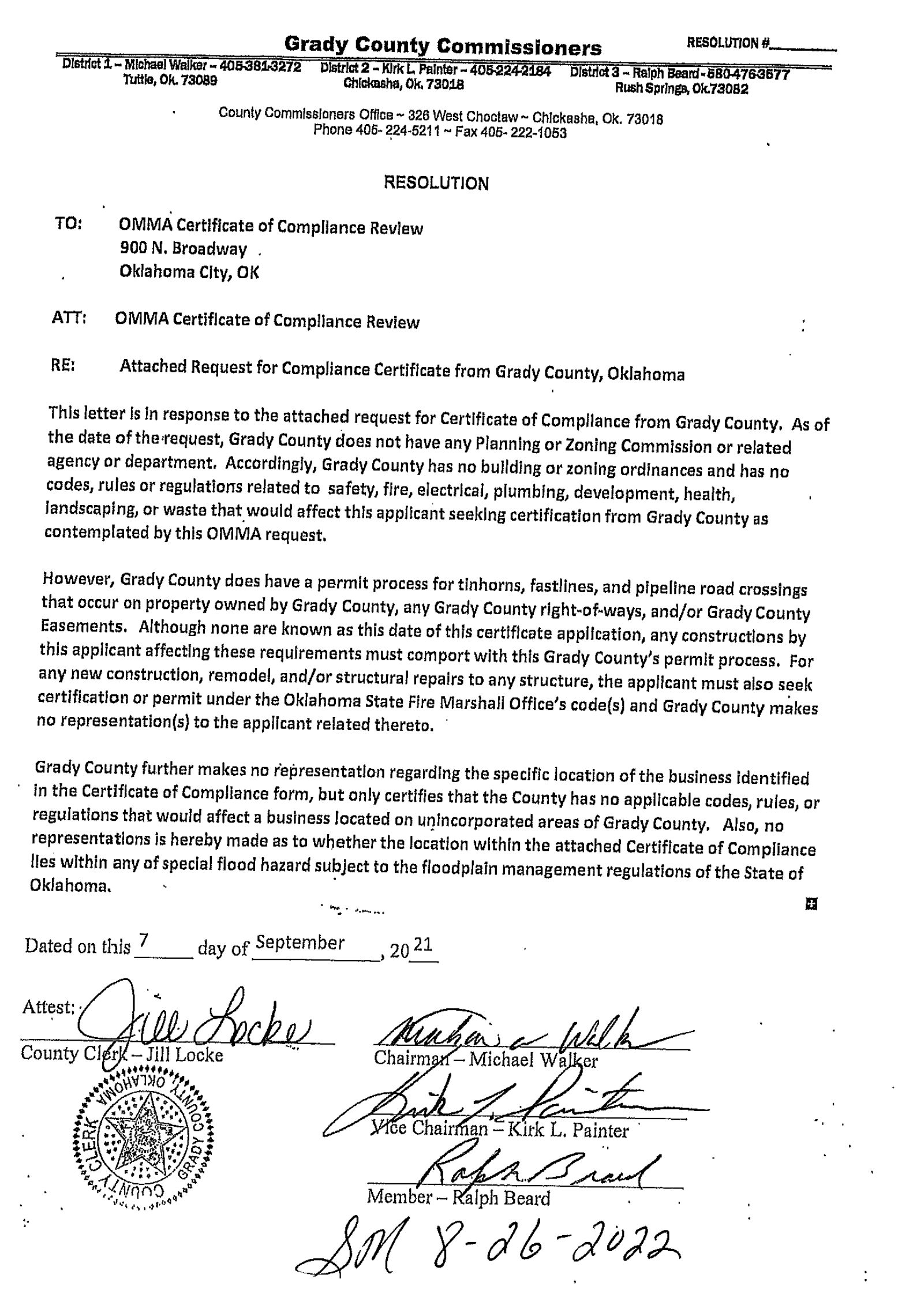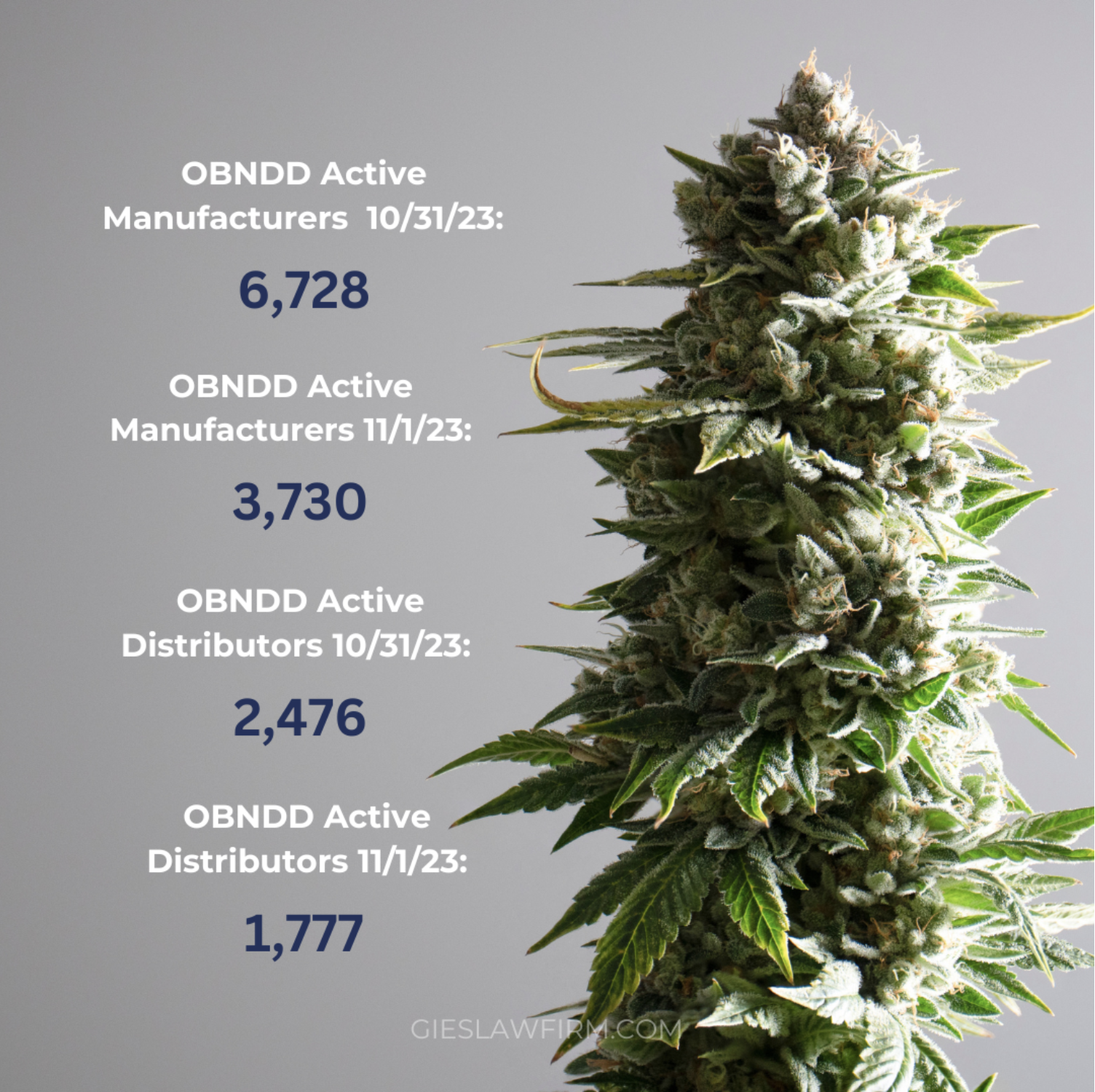From Compliance to Chaos: How Oklahoma’s COO Policy Shift Is Leaving Cannabis Businesses in Limbo
A regulatory triangle between OMMA, OBNDD and the State Fire Marshal has left thousands of medical marijuana businesses stuck in limbo and recent blanket renewal application approvals only deepen the confusion. To understand why, it’s necessary to trace how Oklahoma’s Certificate of Occupancy (COO) requirement emerged.
The issue began in early 2023, when the Oklahoma Bureau of Narcotics and Dangerous Drugs (OBNDD) updated its licensing rules to require a finalized COO as part of the controlled substances permit process. At the time many cannabis businesses, particularly in rural areas, had never been asked for a COO and had previously submitted OMMA’s issued “Certificate of Compliance.” The Certificate of Compliance (COC) was a document historically accepted by OMMA that confirmed a cannabis business was operating within local jurisdictional awareness. It was often signed by county officials or code enforcement officers in areas without formal zoning laws.
As Larissa from Landmark Solutions, a land use expert who worked in jurisdictions across Oklahoma, explains:
“I viewed the COC as more of a check-in document — something that notified local authorities a business was operating within their jurisdiction so that, if any enforcement mechanisms were in place, they could act accordingly.”
Larissa highlighted the biggest issue with OMMA’s COC was that it gave the impression the agency had land use expertise and had coordinated with the Fire Marshal’s Office and local governments to develop the form—or, at the very least, that it understood how local land use systems actually function. The fact that the COC was being signed by individuals with official titles, from code enforcers to county commissioners, and approved by OMMA only reinforced a longstanding truth in Oklahoma: the statement “no codes” wasn’t simply a misunderstanding. It was documented, signed and submitted across the state on official paperwork issued by the state itself.
This context is critical to understanding why the industry was blindsided by the sudden shift in regulatory expectations. While the Unity Bill (HB 2612) technically stated that cannabis businesses must comply with applicable building and fire codes, it also included a key qualifier — businesses were only required to do so unless they were granted an exemption by the Authority or municipality. For years, that exemption took the form of OMMA’s COC, which was designed and accepted by OMMA itself.
Counties like Grady County made their position clear. In a 2021 resolution submitted with OMMA’s own form, county commissioners stated in no uncertain terms that Grady County had no applicable codes, ordinances or enforcement mechanisms related to zoning, fire, plumbing or safety, and therefore had nothing to certify or enforce. This again is a formal documentation created by local government and accepted by the state.
Despite this longstanding practice, things changed in early 2023. The OBNDD implemented a rule requiring a finalized Certificate of Occupancy from the Fire Marshal or a qualified jurisdiction in order to maintain a controlled substances registration. That rule rendered the old COC structure functionally irrelevant. Businesses across the state, many of which had never been inspected before, were suddenly told their documentation was insufficient.
While public safety, particularly fire prevention, is often cited as the reason for implementing these stricter building requirements, statements from OBNDD itself tell a more nuanced story. In several high-profile news articles, OBNDD has emphasized that most facility fires occur at unlicensed marijuana operations, not among the regulated licensee population now subject to these rules.
In this News 6 article, investigators noted that the owners of a grow off Sooner Road “did not have the required building permits to show the building was safe,” and just two paragraphs later, clarified that the operators were not licensed at all. What unlicensed operator is going to apply for a building permit? The very nature of operating illegally is to avoid regulatory visibility. Despite this self-admitted distinction, the enforcement burden has fallen squarely on licensed operators, the vast majority of whom had historically been approved by both agencies submitting state-approved documentation, operated transparently, and were following the designed process.
The impact of OBNDD’s sudden enforcement of the COO requirement was immediate and severe. On October 31, 2023, there were 6,728 active OBNDD manufacturing permits. By the morning of November 1, that number had dropped to just 3,730. Distributor permits fell from 2,476 to 1,777 overnight. Thousands of legal operations were effectively shut down, not for violating the law, but for failing to secure a document that had never previously been required at scale. Many businesses were still racing to submit paperwork to the Fire Marshal up until the final hours of the deadline.
Then in October 2023, OMMA implemented its own enforcement of the COO requirement. On October 27, OMMA issued a statewide email instructing applicants that commercial license applications and location change requests must include a finalized Certificate of Occupancy and other documents such as site plans and final inspection reports. From that point forward, OMMA began rejecting any submission without a finalized COO. No workaround existed, and OMMA offered no flexibility for applicants who had already applied for inspection but had not yet been scheduled or approved.
OMMA’s October 2023 email stating all applicants, even those with COOs would experience a blanket rejection to retroactively apply new rules and laws to their applications.
In June 2024, the landscape shifted again. The legislature passed SB 1635, which amended licensing procedures to include a specific carveout for applicants awaiting a finalized Certificate of Occupancy.
The statutory language states that licensees who:
Submitted a full and complete application for a valid COO,
Did so before February 1, 2024, and
Whose application remains under review by the State Fire Marshal or political subdivision,
shall not be subject to the standard COO requirement at the time of renewal or initial application processing. It’s worth pausing to note here that the original language of SB 1635 put the deadline date for COO proof at August of 2026, and it was amended to February 1st, 2024.
“That context matters, because our industries—engineers, architects, designers—had never before experienced this kind of sudden and overwhelming demand for services. And this type of work isn’t meant to be rushed; it requires thoughtful, deliberate analysis.
To add another layer of complexity, architects and engineers are typically focused on new construction or high-occupancy uses—think hospitals, schools, or community centers. But what we were facing here was entirely different. These weren’t QuikTrips or Walmart layouts. Most of the cannabis facilities were pre-existing structures that had been modified in highly individualized and often unconventional ways.”
In response to this statutory change, OMMA released an official “Attestation of Application for Certificate of Occupancy” form on June 26, 2024. The agency stated in writing that applicants who had been previously rejected could upload this form to “correct” the deficiency and bring their application into compliance.
OMMA’s June 2024 email stating attestations would “correct” lack of COO.
Despite this, OMMA has been interpreting the provision in a way that avoids formal denials but still allows the agency to reject or indefinitely hold applications using valid attestations. Their position has evolved into a claim that they are not obligated to approve — only prohibited from issuing a final denial.
It’s certainly an argument… however, we believe this interpretation undermines the purpose of the statute, which clearly intended to protect applicants from adverse outcomes while they awaited inspection. By continuing to reject applications for lack of a finalized COO, even when all statutory criteria are met, OMMA is functionally denying relief the law was explicitly designed to provide.
For the next ten months following OMMA’s official attestation communication, OMMA continued to reject every application submitted with the attestation form. Even when submitted correctly and within the stated statutory timeframe, applicants were repeatedly told their submission included the “wrong document.” The goal posts officially moved as applicants were advised by OMMA licensing to keep reapplying with the attestation and expect to be rejected until they could obtain a finalized Certificate of Occupancy. In effect, OMMA publicly offered a path to compliance, but internally treated that document as invalid. Many businesses remained (and remain) stuck in a loop of rejections with no clear way out.
An example of a COO rejection for an applicant submitting the OMMA provided Attestation
Then recently, everything changed again, at least for some.
Dozens of long-pending applications have been approved without any material change to their COO status. Many of them had been sitting in the system since 2023. Several of them relied solely on the same OMMA-issued COO attestation form that had been the very basis for nearly two years of repeated rejections.
No process updates were shared with the public. No guidance was released. And no effort was made to extend this reconsideration to the full set of pending or previously rejected applications where the reason was COO specific and the applicant met all the criteria created by the law, reinforced by OMMA in the June 2024 email.
Applicants who had waited years for movement received approvals overnight while others in identical positions continue to receive nothing but rejections.
To make matters more complex, when OMMA delays a license renewal for a year or more, the moment it is finally approved, the licensee is immediately placed back into a 60-day timely renewal window, forcing them to reapply for the current cycle almost immediately. This not only disrupts the applicant’s expected annual fee schedule, it has created further confusion for those who acted quickly to remain in compliance.
Several applicants have already submitted their next renewal application after receiving their long-awaited approvals from 2023-2024, and some have already received rejections solely for not having a finalized COO, despite using the exact same attestation form that led to their approval just weeks earlier. When we made mention of this issue on Instagram, the private messages started rolling in.
The sudden approvals are not the problem. We’re actually quite pleased to see them coming. They were long overdue. But the absence of transparency, consistency and access to the same relief for all qualified applicants is what raises serious concern.
If OMMA can approve COO attestation-based applications for one group, it must explain why it continues to reject the same documentation from others.
If OMMA can approve a COO attestation-based application for a single applicant, it must explain why it continues to reject the exact same documentation from the exact same applicant on subsequent renewals.
Without clarity, businesses are left in a state of regulatory limbo. They cannot plan around their renewal dates. They cannot rely on OMMA’s published processes. And they cannot make sound financial decisions when agency policy is enforced differently from one application to the next.
This is not a new problem. The inconsistent handling of COO documentation — from OBNDD’s rollout in early 2023 to OMMA’s rejection of its own attestation form in 2024 — has resulted in mass license attrition, costly delays and irreparable harm to hundreds of Oklahoma cannabis businesses.
For example, we represent a handful of applicants who submitted new license applications just before the August 2022 moratorium. In 2023, they were subjected to a retroactive application of the COO requirement, despite applying under a regulatory framework that did not yet include it. To this day, some of those businesses are still waiting for approval — nearly three years later — while continuing to pay for facilities they cannot operate or generate revenue from.
There is currently no realistic timeline or even a reliable estimate for how long it may take the State Fire Marshal’s Office to review and approve the thousands of COO applications submitted across the state. In the meantime, legal operators who have done everything right, applying early, submitting documentation, and attempting to comply in good faith, remain stuck in licensing limbo where their business feels constantly on the line.
The core issue is this three-agency collision. As Larissa Daranby put it:
“The OBNDD and OMMA both introduced new requirements tied to documentation from a third: the State Fire Marshal’s Office. It created a regulatory triangle that led to a lot of ‘passing the buck.’”
Until that triangle is resolved with clear communication, shared responsibility and a unified compliance framework many operators will remain stuck in a system where no single agency takes ownership and no one can say when relief is coming.
The recent blanket approvals offered a glimpse of what course correction could look like. But until OMMA extends that same relief to all applicants who qualify under the attestation policy it and the law created and communicates clearly what applicants can expect going forward uncertainty will continue to undermine the integrity of Oklahoma’s regulatory system.
If your license was approved recently, please keep in mind new timely renewal windows. You will have 60 days to submit your current year renewal from the moment you receive your approval email. Until we have further clarification, expect your renewal to be rejected perpetually again unless you have a finalized COO, even though your attestation was recently approved.
If you’re application is still pending and has been repeatedly rejected with a valid COO attestation on file (date of Fire Marshal submission pre-February 2024), you’re not alone. We are actively engaging with clients, regulators and industry partners to demand consistency and transparency. We encourage your individual action to that end as well. The case is clear.
We continue to call on OMMA to take immediate steps toward restoring clarity and fairness in the licensing process:
Honor the attestation policy as written by approving all applications submitted prior to February 1, 2024 that include a completed COO attestation form, as outlined in OMMA’s own June 27, 2024 communication.
Publicly explain the basis for recent approvals where COO attestations were accepted, and clarify why identical submissions from other applicants continue to be rejected.
Establish and publish clear, consistent guidance on acceptable documentation for COO compliance moving forward, so that businesses can plan accordingly and avoid further arbitrary setbacks.
We recognize that OMMA is tasked with a difficult and high-pressure role in regulating a still-developing industry. Our intent is not to criticize, but to advocate for a licensing process that is consistent, transparent and legally sound. Values we believe OMMA shares. OMMA’s made strides recently in many departments. Even their introduction of the attestation form was a meaningful attempt to address a real problem. However, without consistent enforcement, that solution hasn’t materialized for many applicants.
We will keep monitoring and reporting on these developments and remain committed to helping our clients navigate them.
If you need support or have questions about how this affects your license status, we’re here to help. If you need help with obtaining a COO, contact Larissa Darnaby at Landmark Solutions.








